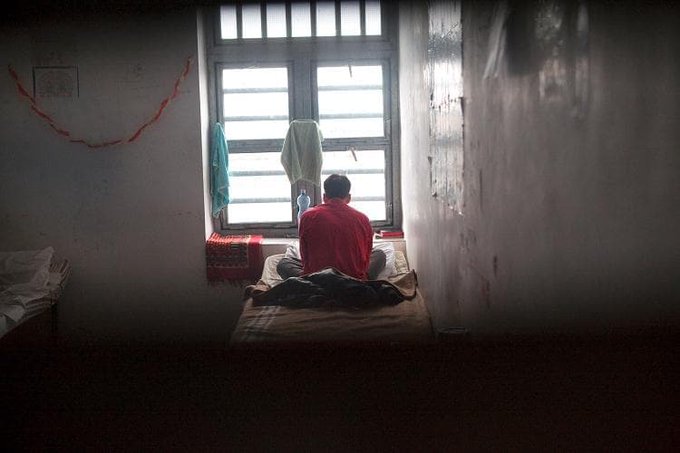The European Court of Human Rights ruled that Hungary arbitrarily detained two children who applied for asylum in 2016. The Hungarian Helsinki Committee represented the asylum-seeking children against the Hungarian state that violated their rights.
On 16 August 2016, the Hungarian Helsinki Committee (HHC) carried out a monitoring visit to the Kiskunhalas Asylum Detention Centre. The organisation’s legal experts met thirteen children detained there. Two of them turned to the European Court of Human Rights (ECtHR), which had recently issued its judgement in their cases. The HHC had already urged the authorities, both on the spot and in its report on the monitoring mission, to do everything possible to put an end to the unlawful detention of minors as quickly as possible.
The HHC was aware that unaccompanied asylum-seeking children should not be behind bars but in the Children’s Home for Unaccompanied Minors in Fót. Even under Hungarian regulations applicable at that time, unaccompanied minors must not be held in asylum detention.
M.H. from Afghanistan and S.B. from Pakistan were two such children, yet they were detained for months unlawfully. They were both 16 years old at the time. Barbara Pohárnok and Orsolya Szántai Vecsera represented them in the Strasbourg proceedings.
M.H. fled Afghanistan from the Taliban and the war. The Police apprehended him in Hungary. Immediately after his asylum interview, he was taken into asylum detention. His first interview report stated that he was 20 years old – because he feared that if he confessed to being a minor, he would be separated from his fellow travellers who had helped him. After the asylum interview, he indicated that he was a minor: 16 years old. He also said that he had an Afghan identity document showing his age. However, the authorities refused to have M.H.’s age assessed by a medical expert. They argued that the boy should carry the assessment’s expenses. He was detained until he could provide a new Afghan document confirming his age. Based on the Kiskunhalas District Court’s decision, he spent three months behind bars – unlawfully.
S.B., a Pakistani national, entered Hungary with a relative who was also a child. He was in a terrible mental state. In his home country, his father and two cousins had already been killed, and several of his relatives had received death threats from Islamist terrorists. The Hungarian authorities interrogated him. They recorded him as an adult. He could only indicate later that he was a child; although he had no papers, he was willing to submit to an age assessment. The asylum authority then informed him that he would have to pay the costs of the examination.
The Hungarian Helsinki Committee’s monitoring report shows that this cost about 73,000 forints (roughly 235 euros) at that time. The authority then informed him that under Hungarian law, he could not initiate and pay for such an investigation; only the authority was entitled to do so. In case of doubt, that is only right: the burden of rebutting the state’s presumption against an individual cannot be imposed on the person, especially not a child.
Ultimately, an age assessment was carried out, and the expert estimated the boy’s age to be 16-17. He was detained unlawfully for two months, also with multiple approvals from the Kiskunhalas District Court.
It is difficult to find words for the authorities’ behaviour towards children in need of help and protection. One could describe it as indifference, negligence, malice, and notorious misleading and lying. The ECtHR says as much in its legalese when it rules that “a child’s extreme vulnerability should be a decisive factor and should take precedence over considerations relating to his or her status as an irregular migrant”.
The judges found that the detention of the applicants became unjustified after the authorities had become aware that they were presumably children. Their detention was not in good faith and was, therefore, arbitrary. The European Court of Human Rights found that the Hungarian authorities failed to react with the required diligence and promptness, and their actions were negligent and indifferent. The judgement ordered the Hungarian State to pay M.H. and S.B. fair compensation of €6,500 and €5,000 respectively.
The Hungarian state detained M.H. and S. B. unlawfully in 2016. Since then, the situation of asylum-seeking children in Hungary has deteriorated considerably, and the new Act on the Entry and Stay of Third Country Nationals, which entered into force this year, now classifies the detention of unaccompanied minors over 16 years of age as “lawful”. The Hungarian Helsinki Committee considers this a severe violation of the law, which it pointed out to the legislator during the social consultation, but in vain.
The Government propaganda speaks loudly and often about ‘protecting children above all else’, but, as we can see here, the government often fails to comply even with domestic laws keeping children safe, especially when it comes to children in need of protection.
“The Strasbourg ruling in the case of our two child clients will be a legal benchmark on the detention of children that the Hungarian state cannot go against. We’ll see whether we will need further similar judgments or the legislator will be willing to comply with child protection requirements from now on”, said lawyer Barbara Pohárnok, assessing the recent judgement.

